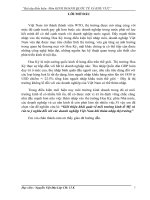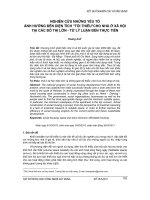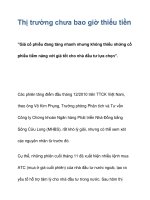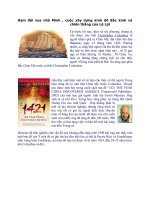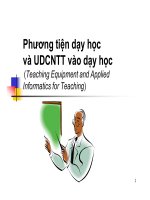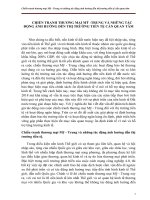Modals_Test (2)_Pham Thi My Tien.docx
Bạn đang xem bản rút gọn của tài liệu. Xem và tải ngay bản đầy đủ của tài liệu tại đây (64.51 KB, 2 trang )
1. Complete the following sentences with a suitable modal of
ability.
a) The question is whether democracy can_______ survive in such difficult
conditions.
b) Fifty years ago a new house could_____be bought for £1,500.
c) Students can_____ be expected to write more than one long essay a week.
d) The mistakes of past historians can_____ now be clearly seen.
e) Jenkins (1976) argued that aluminium could_______ be used in place of steel.
2. Complete the following with a suitable modal of certainty.
a) It could______ not be surprising if the company were bought by a rival.
b) Various social situations can______ lead to a child’s loss of confidence.
c) Other studies confirm that a permanent shift in transport use can______ occur.
d) By 2020 most children could_________ have internet access by the age of 5.
e) If the pressure is lowered, the reaction could______ take place more quickly.
f) In the long term, solar power can______ make a significant contribution.
g) Many seventeenth-century farmers may______ not write their names.
3. Use a suitable modal of obligation to complete the following.
a) Students studying abroad have to_______ take some of their favourite music
with them.
b) All books have to______ be returned to the main library by June 19th.
c) First-year undergraduates have to______ take at least three modules from the
list below.
d) The second part of the essay should______ focus on the differences in the
results.
4. In the following sentences, the meaning changes according to the
modal verb used. Find two possibilities, giving the meanings in
each case.
Example:
Using the internet means the company can sell its
products worldwide. (ability)
Using the internet means the company might sell its
products worldwide. (possibility)
a) The poorest people can_____ be helped by improving the supply of water.
(ability _______)
The poorest people might______ be helped by improving the supply of water.
(possibility _______)
b) Tribal leaders of the first century BC could______ have used writing.
(ability________)
Tribal leaders of the first century BC might_______ have used writing.
(possibility_________)
c) Few people can_______ agree to take part in the experiment.
(ability__________)
Few people should________ agree to take part in the experiment.
(recommendation__________)
d) Care must_____ always be taken when interpreting nineteenth-century data.
(obligation_______)
Care should_______always be taken when interpreting nineteenth-century data. (
recommendation_____)
e) By the mid-twenty-first century poverty could________ be abolished.
(ability________)
By the mid-twenty-first century poverty must________ been abolished.
(obligation________)
f) Repeating the study can_________ confirm their findings. (ability__________)
Repeating the study may_________ confirm their findings. (posibility__________)
